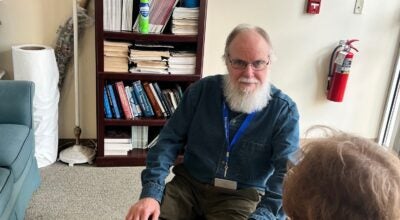Published 8:33 am Friday, May 5, 2017
BY DAVID WHITLOCK
Standing by her bed, I watch her sleeping peacefully. With her bed covers neatly tucked under her chin, she appears almost like someone laid to rest in a coffin. Bending over, I listen, making sure I can hear her breathing.
I don’t know what type of strokes she has had the past few years; all I know it that she is no longer able to verbalize her thoughts as she once could.
Only a few years ago, my wife and I would occasionally take her a meal from church on Wednesday night. That was when my friend lived alone in her small, apartment.
Her world has gotten smaller and smaller.
Today, looking down at her, I decide not to wake her, not ask my usual questions: “How are you today? Sleeping okay? Are you hungry? Can I help you eat this pudding they left on your night stand?”
Today, I decide to sit down in the chair beside her bed.
Today, I say nothing.
Settling down into the stillness, I can now hear my friend’s rhythmic breathing — the occasional popping of her lips as she inhales and exhales.
The resident who shares a room with my friend is also taking her afternoon nap — her deep breaths, in and out, in and out, in and out — almost keep tempo with my friend’s.
Do they ever wake each other? What’s it like to lie there, day by day, listening to the sound of sleep?
Something, perhaps a dream, startles my friend, and she stirs. Smiling at me, I return the smile, reassuring her, all is well.
We say nothing, both embracing the silence.
Then my eyes drift to the ceiling, to the light that can’t have anything more than a 40-watt bulb in it.
Scooching closer to her bed, lowering my head to her level, I try focusing on that ceiling light. How often and for how long does she gaze at that solitary light fixture?
She seems quite content to stare, too. Above her bed, her wall is sparsely decorated with an activities calendar, a bookmark whose significance I don’t know, a couple of “happy birthday” balloons, now nine months old, and the curtain that separates her half of the room from her neighbor’s. Behind my friend’s bed are cards from various people in our church, but she can’t see them, for her view is limited to what is directly in front of her.
Our mutual silence is momentarily broken by the shouts of an unhappy resident in the hall.
“They moving me out,” he yells at someone whom I can’t see. “I ain’t paying that amount of money to stay here,” he bellows.
I cut my eyes to my friend, her placid response, broken only by a raised eyebrow, seems to say, “It happens. I’m rather used to it.”
I nod, as if to say, “I hear you.”
Tempted to fall back to the usual questions, I bite my lip and hold the words.
Our eyes settle in a fixed gaze, almost in a mutual hypnotic trance.
For how long, I don’t exactly know.
Maybe 30 minutes?
And I feel this heavy somberness, like a wet cloud, encircling me, descending on me, weighing me down, because I’m thinking: she must feel so sad to have come to this, and I’m feeling so sad for her that she’s come to this, and I’m thinking how sad it might be for me if I come to this.
And then, quite suddenly, my friend gets my attention, interrupting those sad thoughts.
Twisting back and forth, like she was trying to make herself more comfortable, but at the same time, as if she was already satisfied — like someone who is snuggling in a warm bed on a cold winter’s night, hugging those blankets of security, happily embracing the pleasure of being under the covers — she turned my way.
And breaking into a grin of supreme contentment, she seemed to say, “Thank you for this silence, thank you for sitting with me in my world and not saying anything, for being with me in what for me is just another day.”
Touching her forehead, I blessed her, before exiting.
And glancing back I whispered, “Indeed, it is. Indeed, it is.”






